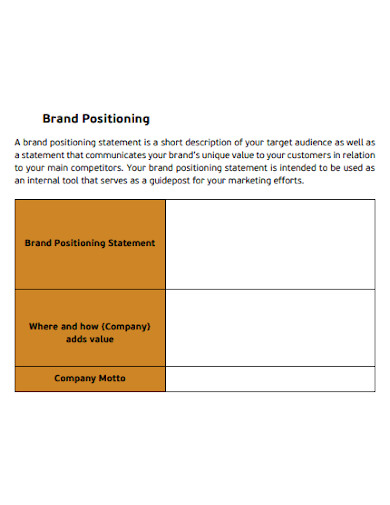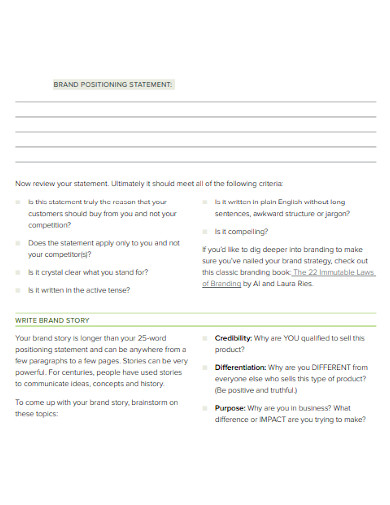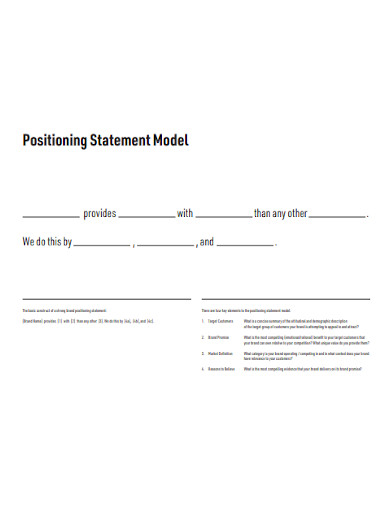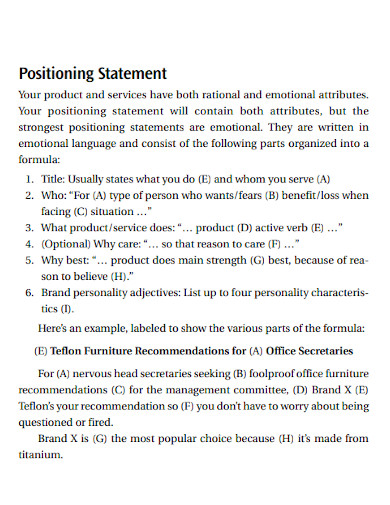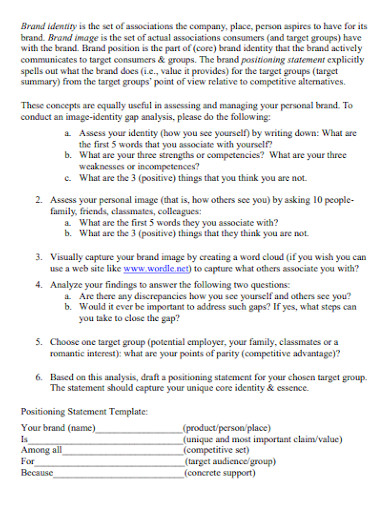9+ Positioning Statement Examples to Download
In the world of brand marketing strategy, one key element that plays a crucial role in defining a brand’s identity and setting it apart from competitors is a positioning statement. A well-crafted positioning statement serves as a concise and compelling expression of a brand’s unique value proposition. In this article, we will explore the concept of a positioning statement, provide a step-by-step guide on how to write one effectively, address common FAQs, and highlight the importance of brand positioning in creating successful marketing plans.
1. Advertising Agency Positioning Statement Template
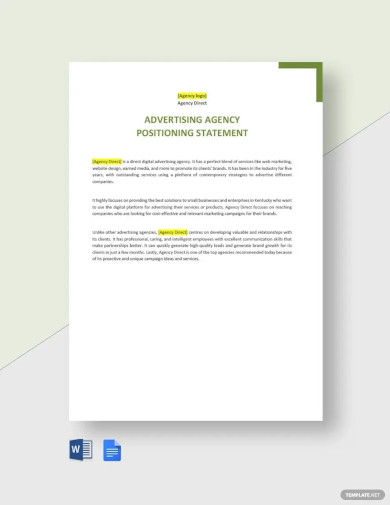
2. Positioning Statements
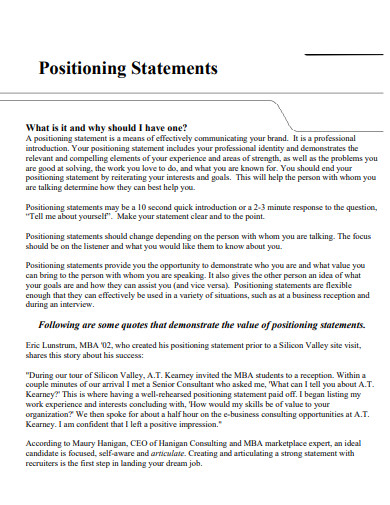
assets.csom.umn.edu
3. Brand Positioning Statement
4. Market Positioning Statements
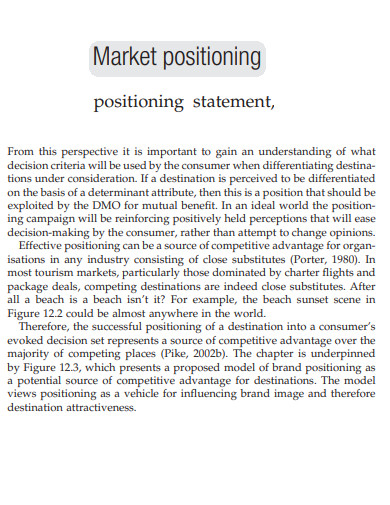
nscpolteksby.ac.id
5. Product Positioning Statements
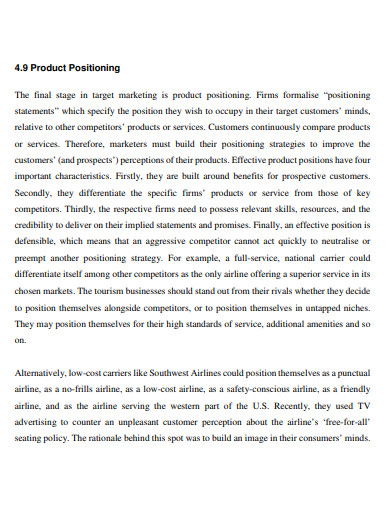
um.edu.mt
6. Positioning Statement Template
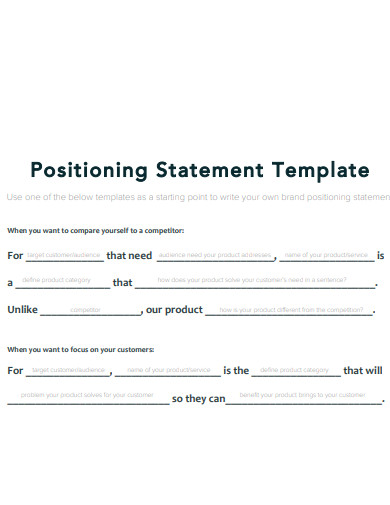
d1eipm3vz40hy0.cloudfront.net
7. Marketing Brand Positioning Statement
8. Brand Positioning Statement
9. Personality Positioning Statement
10. Analysis of Positioning Statement
What is a Positioning Statement?
A positioning statement is a concise declaration that encapsulates the essence of a brand and communicates its unique value to the target audience. It serves as the foundation for a brand’s strategic marketing plan, guiding all aspects of its communication and differentiation efforts. A well-crafted positioning statement provides clarity and focus, enabling the brand to establish a strong and memorable presence in the market. It answers the fundamental questions of who the brand is, what it offers, and why it is different from competitors.
How to Write a Positioning Statement:
Crafting an effective positioning statement requires careful consideration and an in-depth understanding of the brand and its target market. Follow these steps to create a compelling positioning statement:
Step 1: Identify your target audience
Understand who your ideal customers are, their needs, and what they value the most.
Step 2: Define your brand’s unique value proposition
Determine what sets your brand apart from competitors and the specific benefits it offers to the target audience.
Step 3: Conduct market research
Gather insights through market surveys, competitor analysis, and customer feedback to inform your positioning statement.
Step 4: Distill your brand essence
Condense the core attributes, values, and strengths of your brand into a concise and memorable statement.
Step 5: Highlight the customer benefit
Clearly articulate the primary benefit your brand delivers to the target audience and why it matters to them.
Step 6: Differentiate from competitors
Showcase what makes your brand unique and distinct from other offerings in the market.
Step 7: Keep it concise and compelling
Use clear and straightforward language to convey your brand’s positioning in a concise manner that resonates with the target audience.
FAQs
Why is brand positioning important in marketing?
Brand positioning plays a pivotal role in marketing as it helps establish a clear and differentiated identity for a brand. It enables brands to carve out a unique space in the market, connect with their target audience, and influence their perceptions. Effective brand positioning creates a competitive advantage, enhances brand loyalty, and drives customer preference.
Can I use a positioning statement for multiple products or services?
While a positioning statement can be used for multiple products or services within a brand portfolio, it is recommended to have a specific positioning statement for each offering. Tailoring the statement to the unique characteristics and benefits of each product or service ensures a more focused and impactful message.
Should I revisit and revise my positioning statement over time?
Yes, it is crucial to periodically review and update your positioning statement to adapt to changes in the market, consumer preferences, and competitive landscape. Regular evaluation ensures that your brand remains relevant, resonates with the target audience, and reflects any strategic shifts in your business.
Crafting a compelling positioning statement is a critical step in making marketing plans that work. By defining your brand’s unique value proposition, highlighting customer benefits, and differentiating from competitors, you can establish a strong brand positioning that resonates with your target audience. With a well-crafted positioning statement as the foundation, your brand marketing strategy can drive success, create meaningful connections with customers, and ultimately achieve your business goals.



